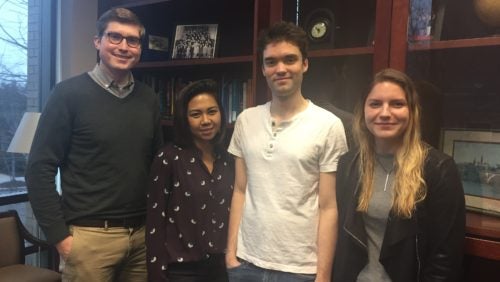Clinic Students Draft Brief for Full Fifth Circuit
February 1, 2018

Students Ian Engdahl (L’18), Joyce Dela Pena (L’18), Jarrett Colby (L’18) and Caitlin Anderson (L’18) drafted a Fifth Circuit brief in Professor Brian Wolfman’s Appellate Courts Immersion Clinic in Fall 2017.
In Professor Brian Wolfman’s Appellate Courts Immersion Clinic, students Caitlin Anderson (L’18), Jarrett Colby (L’18), Joyce Dela Pena (L’18) and Ian Engdahl (L’18) drafted a brief on a rehearing after Alvarez v. City of Brownsville was decided by a Fifth Circuit panel last June.
The case was reheard “en banc” by the full Fifth Circuit on January 16 — with the students’ comprehensive brief now part of the record.
George Alvarez was arrested and jailed by the City of Brownsville, Texas, for intoxication and suspicion of vehicle burglary. While being booked, he was involved in an altercation with law enforcement officers in jail. He faced 10 years for assault on a public servant and pleaded guilty.
“Mr. Alvarez pleaded guilty even though he was innocent, because it would have been his word against the word of his accusers, all of whom were law enforcement officers,” Colby said.
What Alvarez didn’t know when he pleaded guilty was that police had a security video of the incident, showing that the 17-year-old did not assault the officer. In fact, the officer used force against Alvarez in an attempt to move him into a jail cell. Not until another inmate filed a lawsuit against the city did the exculpatory video surface. By the time Alvarez was released on a habeas petition, he had served four years for a crime he did not commit.
Alvarez sued, alleging that the city and its officers violated his constitutional rights by failing to disclose the video before he entered the plea deal. A federal trial judge agreed and a jury awarded him $2 million.
But in June, a three-judge panel of the Fifth Circuit reversed, holding that due process did not require the city to disclose an exculpatory video before entering into a plea agreement. Alvarez and the students disagree.
“He had been picked up for alleged public intoxication,” Dela Pena said. “This is a 17-year-old kid who was looking at a possible 10-year sentence. It’s just not right.”
How big is this case? Anderson noted that 95 percent of state and 97 percent of federal cases are resolved by plea bargain. “In a plea deal, there isn’t really the kind of equal power that you’d expect in a typical contracting situation, for example, so the government can induce people to plea by offering them lighter sentences…,” she said. “But studies show that in some situations, that has caused innocent people to take guilty pleas.”
And the problems of plea bargains, Anderson said, disproportionately impact people that are already disadvantaged by the criminal justice system, including low income defendants and people of color. “Access to counsel, access to exculpatory information, as in this case, could affect whether a defendant would choose to take a plea or not.”
Highlights
When the Alvarez decision came down on June 26, Wolfman reached out to Alvarez’s attorney the same day. They would file a motion for the Fifth Circuit to rehear the case.
So when the clinic began in Fall 2017, Anderson, Colby, Dela Pena and Engdahl began researching, writing and familiarizing themselves with the law. Clinic Fellow Wyatt Sassman played an important supervisory and mentoring role.
“As someone who came to law school knowing that I want to litigate public interest cases, I was rearing to get out of class and into more experiential settings — where I could be applying what I had learned, honing my skills, and doing work that has a tangible impact,” Dela Pena said. “Every opportunity to do that has been a highlight of my Georgetown career.”
Halfway into the semester came the good news — the Fifth Circuit had granted the motion to rehear the case. So the students got the opportunity to draft the Fifth Circuit brief, which the clinic filed with the court in early January.
“In United States v. Ruiz, the Supreme Court was presented with the general question of whether people have a right under Brady v. Maryland to disclosure of exculpatory information before accepting a plea agreement,” Engdahl said. “But the Court narrowed the question…and only decided that there is no right to impeachment evidence, leaving open the question that this case presents — can exculpatory evidence be withheld in plea negotiations?”
Anderson noted that there is a lot still at stake for Alvarez, the client. “He was awarded $2 million at trial, and the Fifth Circuit panel reversed that.”
The fate of the $2 million award, and the right to receive exculpatory information in plea bargaining, is now in the hands of the full Fifth Circuit.
Great training
The students have high praise for experiential learning at Georgetown.
“Before coming to law school I had worked at a firm, and had worked with Brian on a couple of different cases, so I knew how good of a litigator he was, what his style would be, and I thought he would be a great professor,” said Engdahl, who will be joining Hausfeld in D.C.
“I liked the idea of being completely immersed in law practice and the opportunity to strengthen your writing as much as possible… It’s amazing training for when you actually start practicing,” said Dela Pena.
She will be clerking at both the D.C. Court of Appeals and the U.S. District Court for the District of Columbia.
“The opportunity to work full-time on litigation, and especially appellate litigation, was really attractive,” says Colby, who will be heading to Davis Polk and Wardwell in Washington, D.C., in the fall. “Litigation is what I want to do, so doing that five days a week, full time, and getting course credit for it is an amazing opportunity.”